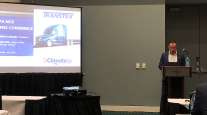Low-Growth Economy Persists, Seen as Likely to Continue

That's the view of two economists at an Oct. 2 panel here who pointed out relative winners and losers in a weak economy that is still better than most other nations.
“It’s a very fragile world now,” consulting economist Diane Swonk said at the Management Conference & Exhibition of American Trucking Associations.
Swonk said this year will probably be the weakest year for U.S. growth since the Great Recession ended. She said there are signs the economy is now “moving in the right direction, but it’s going slowly, like running in mud.”
ATA Chief Economist Bob Costello hosted the annual discussion and said trucking has suffered this year from a painfully slow correction in high inventories and weak manufacturing.
Swonk said economic woes abroad led to a very strong dollar that made U.S. exports too expensive to buy. Costello said less-than-truckload carriers and steel haulers have borne the brunt of that.
However, Costello also said trucking executives should be careful about attacking international trade, as U.S.-Canada-Mexico commerce has been a strong customer for North American freight services.
“In the post-North American Free Trade Agreement era, we’ve seen growth in exports moved by truck outstrip overall growth of domestic freight over the past two decades,” Costello told fleet and other industry executives.
Costello dissected recent industry performance by sector. In contrast to steel haulers in the flatbed sector, he said the same group that specializes in building products is doing well.
While Costello’s ATA tonnage index has shown growth for much of the year, he said the number of loads hauled is either flat, year-over-year, or in decline, depending upon the sector.
“We’re seeing clear deceleration,” he said of load volumes.
Refrigerated loads have grown only modestly this year, by 0.7%, but after a booming 2015.
Tank truck loads have grown by 0.3% this year, he said, but that comes after a 1.1% contraction in 2015.
Looking at oil production and prices, Swonk was optimistic. She said she anticipates the price of crude oil will remain in the $40 to $50 a barrel range that she described as a “sweet spot,” not so high as to hobble consumers but high enough to reward oil producers.
Costello said he is “hopeful that we are nearing the bottom of this [weak economic] cycle and will soon expect a modest rebound.”
Swonk said corporations are doing well enough to engage in stock buy-back programs to boost share prices and offer dividends to stockholders, but they are holding back on investments that could lead to significant growth.
In an interview after her remarks, Swonk said she is not a pessimist, but following the economy can produce frustration.
“Things should be kicking in, but CEOs are not pulling the trigger” on investment plans, she said.
“They don’t want to make a bet on the future. This is hesitation on their part, not pessimism,” Swonk said.




